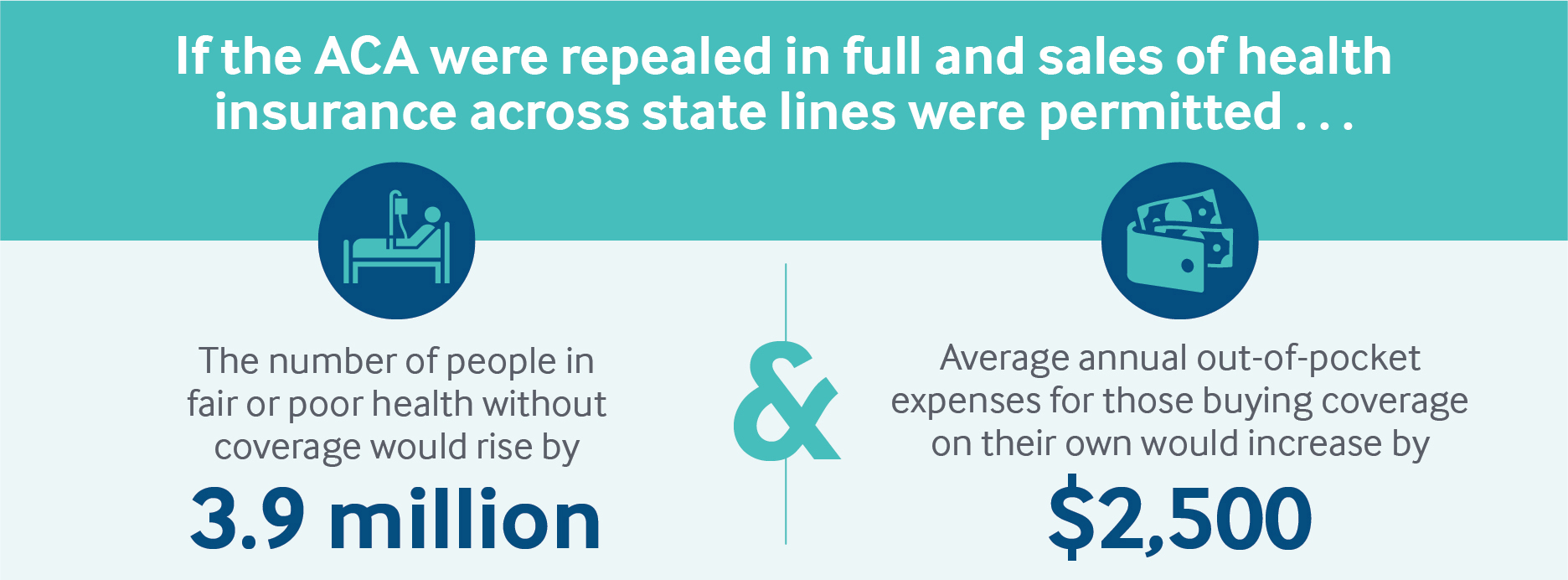How would cross-state insurance work?
Under many Republican health reform proposals, insurance companies would be able to sell their policies across state lines. As long as a health plan complied with any one state’s regulations, that plan could then be sold nationwide—without necessarily complying with the regulations in every state.
What’s the backstory?
States have historically played a leading role in regulating health insurance. Prior to the 2010 enactment of the Affordable Care Act (ACA), state insurance regulations varied widely. States differed in the extent of medical underwriting they allowed, in their “guaranteed issue” requirements regarding people with preexisting conditions, and in permitting or preventing coverage denials for certain medical conditions. To sell policies in multiple states, insurers had to comply with each state’s insurance regulations.
The ACA created a more uniform system of rules for health insurers. The law provides a regulatory floor for health plans sold to individuals across all 50 states by requiring insurers to offer a plan to anyone who applies, prohibiting insurers from excluding coverage of preexisting health conditions, placing limits on what people can be charged based on their health, gender, or age, and requiring that every plan offer a set of “essential benefits,” such as preventive services and maternity care.
The ACA allows insurers to sell policies across state lines in states that have joined “health care choice compacts.”1 Six states—Georgia, Kentucky, Maine, Rhode Island, Washington, and Wyoming—have passed laws permitting such compacts. No states have joined them, and no insurers have expressed interest in selling plans in such an arrangement.2
How would cross-state insurance sales differ from current policy?
Republican reforms would eliminate most of the ACA’s national regulations, thereby making it easier for insurers to sell health insurance policies across state lines.

Note: Estimates are for 2018, with Affordable Care Act as baseline.
Data: E. Saltzman and C. Eibner, Donald Trump’s Health Care Reform Proposals: Anticipated Effects on Insurance Coverage, Out-of-Pocket Costs, and the Federal Deficit (The Commonwealth Fund, Sept. 2016).
What are the basic arguments for and against cross-state insurance sales?
Conservatives believe allowing insurers to sell policies across state lines would inject competition into the individual market, which would lower costs for consumers.
Critics argue that if cross-state sales became widespread, the individual insurance market could become a race to the bottom. Insurance companies, they say, would relocate to states with the most insurer-friendly regulatory environments—in effect allowing national health care policy to be dictated by the most permissive states.
How would cross-state insurance sales affect costs and coverage for consumers?
If insurers sold plans across state lines, bare-bones catastrophic plans with low premiums and high out-of-pocket costs are likely to proliferate. These plans tend to appeal to younger, healthier adults who expect to use few health care services. This group may therefore see lower overall costs.
But as the young and healthy congregate in low-premium, high-deductible plans, insurers would become more reluctant to offer comprehensive policies. This would make it harder for older and sicker adults, who need more health care services, to obtain adequate coverage at an affordable price. With the remaining comprehensive plans attracting mostly sicker, costlier enrollees, premiums and out-of-pocket costs would increase sharply. RAND researchers estimate that average annual premiums overall could rise by as much as $2,500 a year if the ACA were repealed in full and cross-state sales were permitted.3
Cross-state sales of insurance are unlikely to otherwise produce any cost savings for consumers. Because out-of-state insurers have no current relationship or market share with in-state hospitals and physician practices, it would be difficult for these insurers to establish networks that can compete with established in-state carriers. This would make it hard for out-of-state insurers to negotiate sufficiently low payment rates to enable them to offer competitively priced plans. Out-of-state insurers would only be able to offer plans with higher premiums than their competitors, producing no net benefit to consumers.4
If the ACA were repealed, permitting insurers to sell policies across state lines would do little to offset the resulting coverage losses. According to RAND, in this scenario 17.5 million Americans would lose coverage, rather than 19.7 million under ACA repeal alone.5 And most of those gaining coverage through cross-state sales would be the young and healthy.
To learn more, see our To the Point post Selling Health Insurance Across State Lines Is Unlikely to Lower Costs or Improve Choice.
